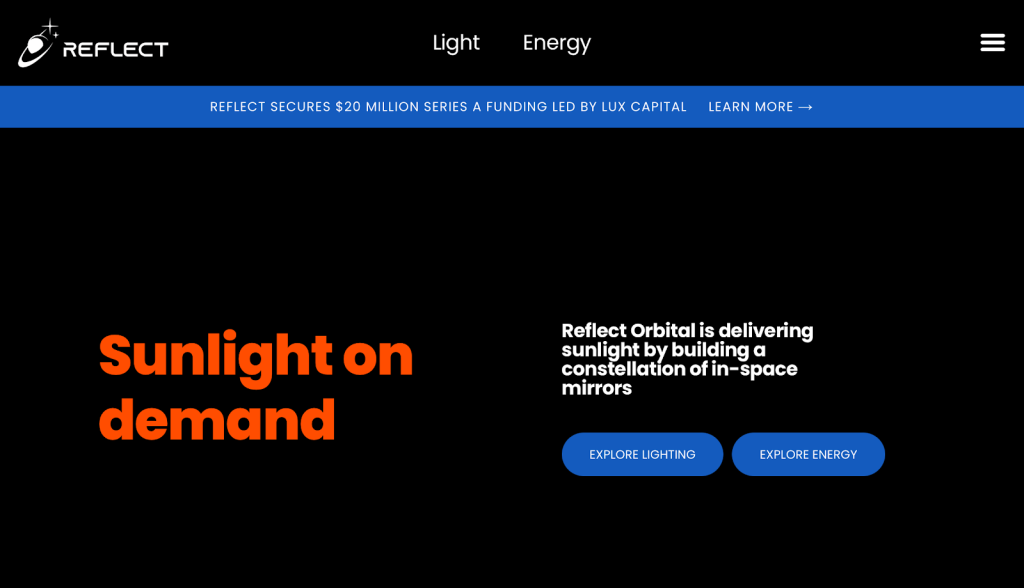Reflect Orbital Raises $20M to Deliver Sunlight On Demand with In-Space Mirror Constellation
July 14, 2025
byFenoms Startup Research

Reflect Orbital, founded by Ben Nowack, has raised a transformative $20 million Series A round to build a constellation of in-space mirrors that can reflect sunlight to specific locations on Earth - offering what they call “sunlight on demand.”
The funding round was led by Lux Capital, with participation from Sequoia Capital and Starship Ventures, backing a vision that straddles the lines of energy, climate resilience, space technology, and infrastructure.
Turning Sunlight Into a Service
The company’s satellites will function as highly mobile reflectors, orbiting Earth and redirecting sunlight to targeted regions - extending daylight hours, powering emergency operations, aiding agricultural growth, and supporting energy balancing during peak demand.
Unlike traditional solar power approaches, Reflect Orbital doesn't harvest sunlight - it controls where it lands. This leap allows them to turn light itself into a programmable utility, creating a powerful new form of infrastructure that doesn’t need to be installed on the ground.
Here’s What Founders Need to Learn From This
The real genius behind Reflect Orbital isn’t just the hardware - it’s the reframing of sunlight as a logistics problem, not an energy one. While most climate tech startups compete for advances in storage, panels, or fusion, Reflect Orbital stepped back and asked: What if we just moved the light itself?
This is the kind of shift founders should chase. When you treat fundamental forces (like light, attention, liquidity, or bandwidth) as allocatable commodities, you unlock markets that incumbents can’t even see.
Here’s the ultra value: Control, not creation, is where scale happens. Reflect Orbital doesn’t produce sunlight. It routes it. In every vertical, there's something already abundant but poorly directed - your startup’s job might not be to invent more, but to redistribute better. That’s where untapped market leverage lives.
Industry Outlook: The Space-Energy Nexus Is Heating Up
Reflect Orbital is entering a market at the convergence of space tech and renewable energy, two sectors experiencing parallel explosions in innovation and capital inflows.
- The orbital infrastructure market is expected to surpass $350 billion by 2030, as governments and private players shift focus from launch services to persistent orbital utilities.
- The renewable energy storage and delivery market is on pace to hit $4.5 trillion by 2035, with a growing emphasis on grid load balancing and real-time energy access.
- The agriculture tech sector, where light manipulation has direct ROI, is projected to exceed $43 billion globally by 2027, per MarketsandMarkets.
What makes Reflect Orbital different is their ability to create value across these three verticals at once, while sidestepping legacy installation costs.
Investor Confidence Reflects a Bold New Category
With deep-tech backers like Lux Capital - long known for its bets on frontier science - and Sequoia Capital, Reflect Orbital gains more than capital. It gains the strategic edge to navigate regulation, scale hardware manufacturing, and lock in institutional contracts.
Starship Ventures further rounds out the round with industry-specific knowledge of orbital logistics and commercialization.
The funding will allow Reflect Orbital to launch its first demonstrator satellites, scale its adaptive mirror tech, and build software for real-time geospatial targeting of reflected light.
What’s Next for Reflect Orbital
In the next 12 months, the company plans to:
- Deploy its first functional mirror prototypes in low Earth orbit
- Partner with agencies in agriculture, disaster relief, and military logistics
- Expand its engineering and mission control teams to support 24/7 light routing
- Launch a “Sunlight-as-a-Service” B2B platform, where enterprise customers can schedule illumination for high-impact use cases
Reflecting Orbital’s long-term goal is clear: create a global infrastructure layer where light can be directed like bandwidth, unlocking vast economic and humanitarian benefits.









